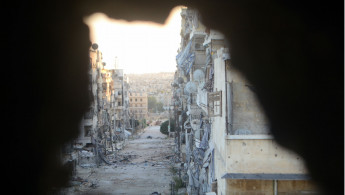Syrians fear new chemical attack following Russia 'warnings'
Syrians fear new chemical attack following Russia 'warnings'
Syrians are concerned of a new regime chemical attack, after Russian media warnings of 'false flag' operations,
a trend that preceded previous deadly toxic onslaughts.
a trend that preceded previous deadly toxic onslaughts.
4 min read
Syria has witnessed scores of chemical massacres in Syria [Getty]
Syrians fear Bashar al-Assad's regime could be planning another chemical attack, after Russian media claimed rebels were planning "false flag operations" - a tactic employed by Moscow before previous toxic gas massacres, to smear the opposition and deflect blame from the regime.
It started when Russia's defence ministry claimed on Saturday that rebels have shipped chlorine cannisters into Syria to enact a chemical attack and blame civilian deaths on Bashar al-Assad's regime.
State funded outlets, such as RT, also posted stories about "foreign specialists" entering opposition areas to "stage" a chemical attack, based on comments by Russian generals.
Images allegedly showing a camera crew staging such a scene appeared on pro-Russian social media accounts over the weekend. It soon emerged that the images were lifted from actual film sets linked to the regime.
"Embarrassing. This [image] is actually a shot on the set of Revolution Man, a pro-[government] Syrian film against the uprising," tweeted Beirut-based journalist Kareem Chehayeb.
"This is the second time since April a Russian embassy has used a screenshot from that movie claiming it's intercepted intel of a 'staged' chemical attack."
On Monday, Russian government-run Sputnik ran a poll on its Arabic site, asking readers: "Do you think a fabricated chemical attack will take place despite Russia's warnings? Vote here."
The site did not reveal the results so far, but the final outcome will likely support Moscow's claims.
Twitter profiles linked to Russian foreign ministry have also shared the "false flag" stories, in what appears to be an effort to spread Russian disinformation to audiences across the world, a common tactic of the Kremlin.
|
|
| Images of film scenes have been used to spread allegations of planned dalse flag operations |
"Terrorists prepare fake chemical attack in Syria. 8 chlorine containers delivered to Hallouz near Jisr al-Shughur in Idlib province. 'Victims' to be saved by White Helmets, trained by UK-based Olive Group. Pretext for new airstrikes by US, UK," Russia's embassy in the UK tweeted.
These tweets have been widely used by figures closely linked to Moscow and Damascus.
Hizballah leader Hassan Nasrallah backed the claims during a speech on Sunday, saying the West was preparing to "stage" a chemical massacre, "to use as a pretext to launch an aggression on Syria".
Opposition activists and analysts have pointed out that the same stories flooded Russian and pro-regime media in the weeks and months preceding other deadly chemical attacks on opposition areas.
Even if an attack does not take place, analysts say such fear-mongering by Kremlin-linked media outlet help muddy the waters and spread doubts when chemical attacks do take place.
"There's multiple examples of the Russian ministry of defence warning of impeding false flag chemical attacks, often with specific details and they've never happened," Eliot Higgins, founder of online investigation outlet Bellingcat, told The New Arab.
"This is just Russia laying the groundwork for future denials of chemical weapon use, propaganda for the purpose of war crime denialism."
Such a tactic has been successful, with high-profile figures such as Theodore Postol and Seymour Hersh backing Moscow's dubious claims.
The Syrian Archive have documented 212 chemical attacks in Syria since the start of the war in 2011.
Independent bodies have said the Syrian regime is almost certainly responsible for the vast majority of these attacks, including the use of sarin on the Khan Sheikoun in Idlib, which left around 100 dead.
Russia has been a close ally of Bashar al-Assad since the outbreak of the Syria war in 2011. In 2015, Russia's air force launched air strikes on opposition areas, with Moscow's fire power a key component to recent regime successes against the rebels.
Moscow has also used its media and political clout to deny regime war crimes and block international intervention against them.
Kremlin-linked media have claimed previous chemical attacks on opposition villages were "false flag operations" by rebels, or that they never took place.
The deluge of social media activity around Moscow's most recent claims follow last week's warnings by the US, UK and France to Russia that it would not tolerate another chemical attack in Syria.
The tripartite launched limited retaliatary stikes on selected regime research facilities in Syria following a chemical attack in Eastern Ghouta in 2018, while the US struck military installations in 2017 following the Khan Sheikhoun massacre.
Independent investigators, including the UN, have blamed these chemical masacres on Damascus.
A deadly gas attack in Eastern Ghouta in 2013 under ex-President Barack Obama did not lead to US military intervention, despite hundreds of civilians dying after being exposed to the toxic substance.
Follow Paul McLoughlin on Twitter: @PaullMcLoughlin



